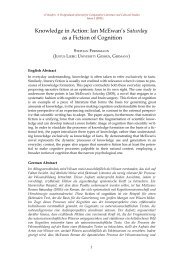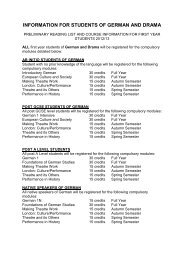Student Handbook - The School of Language, Linguistics and Film
Student Handbook - The School of Language, Linguistics and Film
Student Handbook - The School of Language, Linguistics and Film
Create successful ePaper yourself
Turn your PDF publications into a flip-book with our unique Google optimized e-Paper software.
• a friend – you have the right to be accompanied by a friend when you make a complaint,<br />
or at any subsequent meeting to deal with the complaint.<br />
This Policy covers student concerns or complaints about the provision <strong>of</strong> a programme <strong>of</strong><br />
study or related academic or administrative service. <strong>The</strong>re is a separate policy covering<br />
‘appeals’ – i.e. requests for the review <strong>of</strong> an examination board decision relating to the<br />
overall assessment, progression or the classification <strong>of</strong> a degree: these requests are<br />
considered under the provisions <strong>of</strong> the Regulations covering the Review <strong>of</strong> Examination<br />
Board Decisions.<br />
<strong>The</strong> <strong>School</strong> aims to provide effective teaching <strong>and</strong> assistance with academic matters, with<br />
the resources it has at its disposal. If you feel that what is provided falls short <strong>of</strong> this, there<br />
are various avenues open to you to express your feelings on the matter. Which you choose<br />
will depend on the type <strong>of</strong> problem you have encountered.<br />
Types <strong>of</strong> Complaint<br />
Complaints are <strong>of</strong> two kinds: informal <strong>and</strong> formal.<br />
Stage 1: Informal<br />
If the problem is relatively straightforward, it can probably be settled informally. A brief talk<br />
with the member <strong>of</strong> staff in question may be sufficient to solve your problem. Even if it has to<br />
be referred upwards, to the Chair <strong>of</strong> department or Head <strong>of</strong> <strong>School</strong>, it may still be possible to<br />
deal with the matter by a face-to-face conversation. No record will normally be kept <strong>of</strong> such<br />
a complaint <strong>and</strong> you should not feel nervous <strong>of</strong> approaching any member <strong>of</strong> staff in such a<br />
way.<br />
<strong>The</strong> object <strong>of</strong> this informal first stage is to resolve problems quickly <strong>and</strong> easily with a<br />
minimum <strong>of</strong> formality. You should receive a response within a week.<br />
1. If you find some aspect <strong>of</strong> the teaching or organisation <strong>of</strong> a module unsatisfactory, the<br />
obvious person to talk to in the first place is the teacher concerned. If there are many<br />
teachers involved in a module, you may wish to consult the Module Organiser, whose<br />
name can be found in the Directory <strong>of</strong> Modules. If neither the teacher nor the Module<br />
Organiser can satisfy you, you may take the matter to the Chair <strong>of</strong> department<br />
concerned. If you wish to take the matter further, you may take it to the Head <strong>of</strong> <strong>School</strong>.<br />
2. If you are dissatisfied with the assessment <strong>of</strong> coursework during the course <strong>of</strong> the year,<br />
in the first instance you should take note <strong>of</strong> the feedback given on the piece <strong>of</strong> work, <strong>and</strong><br />
ask the marker or module organiser for additional clarification <strong>of</strong> how the given mark was<br />
reached. If you still feel an error has occurred, you may wish to consult Heather Heiner,<br />
Exams Administrator, who will investigate whether a procedural error has occurred.<br />
3. If the problem is <strong>of</strong> an administrative nature, the first person to speak to is the<br />
Administrator who deals with that area, <strong>and</strong> then the <strong>School</strong> Senior Administrator. If<br />
you wish to take the matter further, you may take it to the Head <strong>of</strong> <strong>School</strong>.<br />
In most cases, you will find it advantageous to consult your Adviser before making any<br />
complaint. He or she may well be able, either to solve the problem there <strong>and</strong> then, or to<br />
indicate whom you can best approach. If the problem is for some reason difficult to discuss<br />
with your Adviser, you may instead talk to the relevant Senior Tutor <strong>and</strong>/or the Chair <strong>of</strong><br />
department. You may also wish to talk to your SSLC representative who can make the<br />
approach on your behalf, particularly if more than one student is affected.<br />
39







